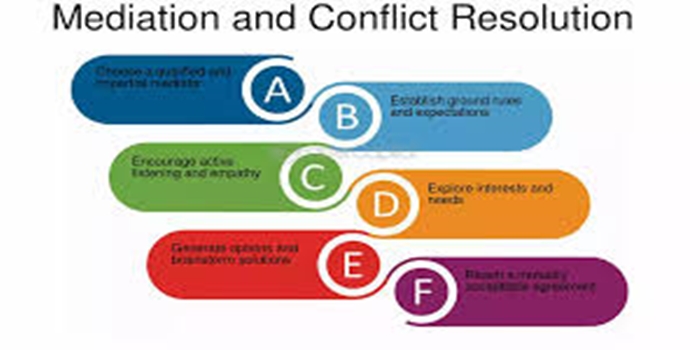In this article, we discussed the meaning of conflicts mediation, the features, the benefits, how conflict mediation can contribute to business development.
Definition
Conflict mediation is a process where an unbiased third party, the mediator, helps disputing parties resolve their differences without resorting to formal legal or coercive methods. It focuses on facilitating communication, understanding, and the development of mutually acceptable agreements.
Features of Conflict Mediation:
Voluntary:
Participation in mediation is typically voluntary, meaning both parties agree to participate in the process.
Confidential:
Mediation is generally confidential, meaning information shared during the process is not disclosed outside of the mediation unless agreed upon by all parties.
Neutral:
The mediator is a neutral third party who does not take sides or impose a solution on the parties.
Flexible:
Mediation processes are often flexible, allowing for informal discussions and adjustments to the process as needed.
Party-Centered:
Mediation focuses on the parties’ needs and interests, rather than imposing a solution or outcome.
Facilitated Negotiation:
Mediation is essentially an assisted negotiation process, where the mediator helps parties explore options and reach a resolution.
Efficient and Cost-Effective:
Mediation can be a more efficient and less expensive method of resolving disputes compared to litigation or arbitration.
Preserves Relationships:
Mediation can help preserve or even enhance relationships between parties involved in a dispute, especially in situations like family law or business partnerships.
Emphasizes Communication:
Mediation emphasizes open and effective communication between parties, helping them understand each other’s perspectives and needs.
Focus on Interests:
Mediators help parties identify and focus on the underlying interests behind their positions, rather than just their stated positions.
Creates a Framework for Understanding:
Mediators help create a framework for understanding the conflict and exploring potential solutions.
Non-Binding (Usually):
While some mediation agreements may be legally binding, many are non-binding, allowing parties to reconsider the agreement if necessary.
Here’s How Conflict Mediation Can Contribute to Business Development:
- Enhances Business Relationships:
Mediation helps maintain business relationships by resolving disputes in a constructive way, allowing parties to continue working together even after resolving the conflict, according to Fotefa Partners.
It fosters understanding and respect between parties, leading to stronger and more collaborative relationships, says Dispute Resolution Agency.
- Saves Time and Resources:
Mediation offers a faster and more cost-effective alternative to traditional litigation, which can be time-consuming and expensive.
By resolving disputes quickly, businesses can minimize disruptions and focus on their core activities.
- Improves Workplace Dynamics and Productivity:
Resolving conflicts can reduce stress and improve employee morale, creating a more positive and productive work environment.
Mediation helps address conflicts before they escalate, preventing them from impacting team performance and business operations.
- Fosters Innovation and Collaboration:
When parties can communicate openly and constructively, they are more likely to find creative solutions and develop new ideas.
Mediation promotes a culture of collaboration and mutual respect, which can lead to innovation and improved business outcomes.
- Reduces Legal Costs:
Mediation can help businesses avoid the high costs associated with litigation, including legal fees, court costs, and lost productivity.
By resolving disputes outside of court, businesses can save money and resources that can be reinvested in the business.
The Benefits of Conflict Mediation:
Cost and Efficiency:
Lower Costs:
Mediation is generally less expensive than litigation, avoiding the high costs of court fees, attorney fees, and expert witnesses.
Time Savings:
Mediation processes are often faster than traditional legal proceedings, leading to quicker resolution of disputes.
Reduced Stress:
The informal and confidential nature of mediation reduces the stress associated with court battles and adversarial proceedings.
Relationship Preservation:
Maintaining Relationships:
Mediation helps preserve ongoing relationships, whether personal, professional, or business-related, by focusing on collaborative solutions.
Addressing Interpersonal Issues:
Mediated agreements can address issues beyond the legal dispute, including procedural and interpersonal concerns, leading to more comprehensive solutions.
Amicable Resolutions:
Mediation can help parties reach amicable resolutions even in situations where termination of a relationship is unavoidable.
Party Control and Empowerment:
Greater Control:
Parties have more control over the outcome of their dispute, as they are actively involved in creating the resolution.
Mutually Satisfactory Results:
Parties are more likely to be satisfied with solutions they have helped create, as opposed to solutions imposed by a third party.
Tailored Agreements:
Mediated agreements can be tailored to the specific needs and circumstances of the parties involved.
Enhanced Communication and Collaboration:
Improved Communication:
Mediation provides a neutral and confidential setting where parties can openly discuss their views and concerns, leading to better understanding.
Fostering Cooperation:
Mediation encourages cooperation and a problem-solving approach, reducing conflict and promoting a more positive environment.
Building Trust:
The process of mediation can build trust and rapport between parties, even in the face of conflict.
Creative Solutions:
Mediation can lead to creative and innovative solutions that may not be possible through traditional litigation.
Confidentiality:
The confidential nature of mediation ensures that sensitive information remains private and out of the public eye.
Building a Foundation for Future Problem-Solving:
Mediation can provide a framework for future problem-solving, helping parties develop better communication and conflict resolution skills.
Conclusion
Conflict mediation, a process where a neutral third party assists discussing parties in reaching a mutually acceptable resolution, that can be a valuable tool for business development. By resolving conflicts efficiently, it can save time and money, foster positive relationships, and create a more productive work environment.


